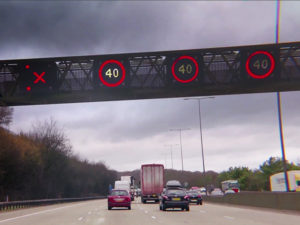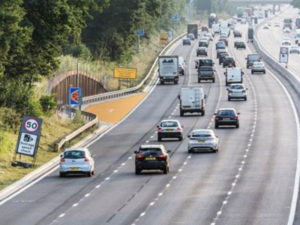Next government could face ‘Post Office-type’ scandal if smart motorways not scrapped
Political parties have an opportunity to finally commit to scrapping all ‘smart’ motorways – or potentially face another ‘Post Office-type’ scandal if they do nothing.

The AA is calling on all political parties to commit to scrapping ‘smart’ motorways
The stark warning comes from the AA, which continues to press for change after more than a decade of warning of the dangers of smart motorways.
With the countdown continuing to the general election on 4 July, it is still not clear what stance the political parties will take on smart motorways. Labour had called for an outright ban in 2023 – but has now watered this down, saying it will carry out a “review” of the controversial roads if it wins the general election, according to The Telegraph.
Prime Minister Rishi Sunak announced in April 2023 that new smart motorways would be scrapped. And National Highways’ latest stocktake accepts: “The risk of a collision and the risk of a serious injury or death due to a stopped vehicle collision is lowest on conventional and controlled motorways [which have hard shoulders].’
Abolishing the remaining ‘smart’ motorways is a major plank of the AA’s Motoring Manifesto and is supported by 81% of drivers.
The motoring services organisation has come up with a solution for the existing 193 miles of ‘All Lane Running’ smart motorways and the 63 miles with a ‘Dynamic Hard Shoulder’ – where the hard shoulder is used as a traffic lane when it is busy.
The AA said its solution would prove relatively simple and inexpensive. On the All Lane Running sections, reinstate the hard shoulder with a Red X and new lane markings. This would bring them in line with the Dynamic Hard Shoulder sections.
The objective would be on all these stretches for the hard shoulder to be in place permanently, but the technology – overhead gantries and the use of ‘Red Xs’ – would still give the opportunity to open this lane to traffic in exceptional circumstances.
The safety advantage is that there would be fewer live lane stops, and keeping the emergency areas and overhead technology adds an extra layer of safety.
These stetches would then become controlled motorways. Controlled motorways with hard shoulders and overhead technology are among the safest roads with reduced live lane stops and incidents. Controlled motorways and Dynamic hard shoulder motorways have lower rates for those killed or seriously injured.
While critics argue that one third of capacity could be lost by giving back the hard shoulder, leading to congestion, the AA refutes this. It says smart motorways don’t really alleviate congestion as more than a third of drivers don’t use the inside lane as they are petrified there may be broken-down vehicles ahead. It also says middle lane hoggers reduce capacity.
The AA also points out that any incident on ‘smart’ motorways causes severe congestion by closing lanes, slowing traffic and delaying the emergency services getting through to crashes, which again puts lives at risk.
To help maintain capacity, the reinstatement of hard shoulders should be backed up by major police campaigns targeting offenders and hard-hitting lane discipline information campaigns to get rid of the middle-lane hoggers and free up road space.
Reinstating the hard shoulder also means the emergency services can get to life-threatening incidents more quickly. The first hour after a casualty collision is the ‘golden hour’ when it is essential to get trauma patients to hospital to give them a better chance of living.
Edmund King, AA president, said: “The ‘smart’ motorway experiment has failed.
“Politicians need to stand up and be counted. There is no great love for ‘smart’ motorways and the vast majority want them scrapped.
“Despite all the hundreds of millions of pounds being spent to retrofit and try to justify a flawed concept, now is the time for a radical change. Drivers do not trust ‘smart’ motorways.
“The answer should be reinstating the hard shoulder, and this should be the aim of every political party if politicians really want to promote motoring-friendly policies. It will be safer and much smarter.
“If not, history suggests future governments will have another ‘Post Office-type’ scandal on their hands, as politicians and civil servants knew from the outset that lives would be put at risk by removing the hard shoulder and putting in inadequate emergency areas.”
Giant display of messages from voters to show impact of ‘smart’ motorways

Smart Motorways Kill has received major numbers of messages from the public describing the effect the removal of the hard shoulder has had on their lives
A giant display of messages from the UK public on how ‘smart’ motorways have affected their lives is taking place next month.
The exhibition will be at Rotherham Titans Rugby ground on 12 June 2024 from 11am to 3pm and will show just some of the messages sent to the Smart Motorways Kill campaign group in recent years.
The group was formed by Claire Mercer, whose husband Jason Mercer was killed on a smart motorway in South Yorkshire in 2019 along with Alexandru Murgeanu. The pair were hit by an HGV after they had pulled over near Junction 34 of the M1 northbound following a minor collision between their vehicles.
In the near five years of campaigning since the deaths, Smart Motorways Kill has received major numbers of social media, messages and emails from the public describing the effect the removal of the hard shoulder has had on their lives; from worrying about “who to grab first” in the event of a breakdown to feeling discriminated against due to being disabled.
A lot of these missives have a focus on “those responsible facing charges”, “let them break down in a live running lane” and now more than ever “using our vote”, “showing them how we feel” and “voting them out”.
Now all these messages from people who feel angry, let down and sometimes scared, injured and/or bereaved have been collated and organised into categories for display.
Tellingly, the section roughly grouped as “The government don’t care” is one of the largest sections.
The strength of feeling and number of messages has only increased over the years – and Claire Mercer said the exhibition had to limit the date range to just the last two years because the number of messages sent and still coming in would make gathering and displaying of all this impossible.
“The sheer scale of less than half the total messages surprised even me and I’m the one they were sent to!
“I started by flicking through as many emails and messages as possible and picking out common themes. They ranged from “Boycott the first lane” to details of the many, many terrifying experiences people had on smart motorways.
“We’ve had years and years of reports, investigations, stock takes and committees. It’s time to show the full picture of how the public feel about these motorways at the only time the Government will care: election time!”
General electionsmart motorwaysThe AA















Jan Bellinger31. May, 2024
I wish to add my voice to the campaign to remove smart motorways
I ama retired driving instructor